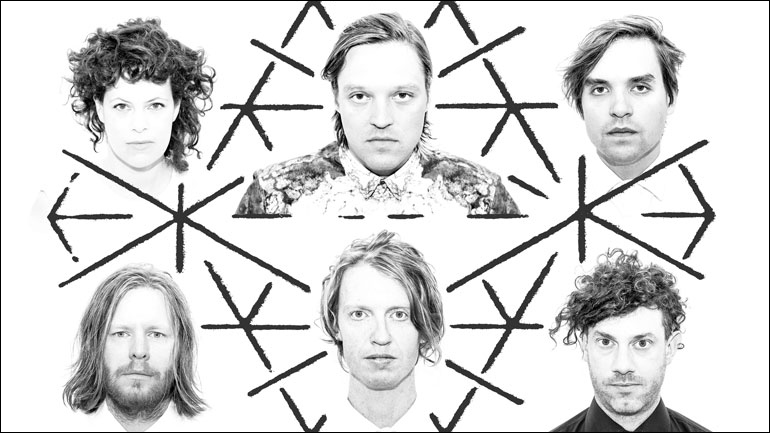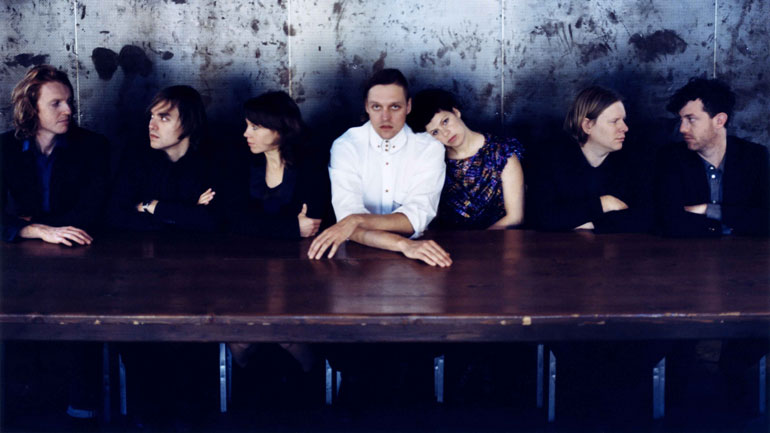Arcade Fire - Reflektor
Canadian indie crusaders Arcade Fire's fourth album pushes through the looking glass.

LAST DECEMBER, ARCADE FIRE played a show in their hometown Montreal under the name of Les Identiks. It was the most secretive of secret gigs, the audience operating under a code of omerta so strict you imagine frontman Win Butler must have come onstage and threatened them with concrete overcoats should they breath a word about the performance. The resulting shields-down news blackout was impressive: the best information that social media could rustle up about the show was that the new songs they played were “dance-y” and “fun". As the band peered over the promotional parapet in earnest, the campaign to launch Reflektor wasn’t much more effusive, a rune-like grid of letters appearing as graffiti on city walls. It’s the kind of approach more suited to working with enriched uranium than stadium indie, all grist to the band’s efficiently-run mystique mill.

In June, however, Butler appeared at a very different kind of hometown show. As a guest of The Rolling Stones at the Montreal date on the 50 And Counting tour, Butler pitched in on The Last Time, wearing a snowy white suit and looming over Mick Jagger like he was about to hug him and pet him and call him George. That the band can leap between such different worlds - the cloak-and-dagger and the celebrity backslap, the art-house and the arena, the classic rock and the cryptic control-freakery - explains the scope of their success but it also hints why detractors consider them old-school rock stars in bohemian drag. If 2004’s Funeral seemed to be generated by a wandering band playing rough music and sweet spirituals, a spontaneous Day Of The Dead carnival on the perimeters of town, then 2007’s fevered follow-up The Neon Bible betrayed a tendency towards more conventional rock’n’roll preaching. Their six-strong form might prevent them from ever making foursquare music, yet drawn inexorably towards the spaces occupied by U2 or Bruce Springsteen, attracted to the high concept and the grand gesture, the loss of Funeral’s unpasteurised intimacies laid them open to accusations of bluster and pomp.
Effective though 2010’s The Suburbs was in its analysis of lost youth and found memories, this fourth album really needed move things along, score a thick black line under the triumph of Funeral and the stylistic tics and excesses of the two subsequent records. The band seem to agree: on the background noise before the ironic railing of fifth track Normal Person, a showbiz-slick Butler is heard thanking the audience for “coming out tonight.” Then there’s a heavy sigh and a quiet monotone asks. “Do you like rock’n’roll music? Because I don’t know I do.”
"A gloriously synthetic album that ditches the pulpit for the dance floor."
It shows. Reflektor propels Arcade Fire through this ambivalence with a jet-pack force, a gloriously synthetic album that ditches the pulpit for the dance floor and preaching to the converted for full-on visionary mania. Former DFA and LCD Soundsystem maestro James Murphy shares production with the band and long-standing associate Markus Dravs, and it’s tempting to see Murphy’s presence as the galvanizing energy behind Reflektor. That might not be fair, but it would explain the album’s electronic fits and starts, the twisted disco and devilish distortions. Lyrically, Arcade Fire might not have perked up much - this is a record lost in a hall of black mirrors, obsessing over good and evil, heaven and hell, love and hate, the ways in which the individual can be reflected back at themselves and be horrified at the image - but the music is often mined with surprises: tempo shifts, turbulence, percussive ticks and pops. Like fire-and-brimstone moralists who realise that lost lambs are more likely to come through the door for a youth club disco than a bible study group, Arcade Fire have decided to offer something shinier, sleeker, more metropolitan.
“If you want to be righteous / get it right,“ sings Butler on the astonishing Here Comes The Night Time, but Arcade Fire sound keen to explore life from the wrong side. Before they shook their heads gravely at the ills of the world, here they want to join in, burrow inside, get their hands dirty. The first few songs in particular convey a real sense of menace, the Billie Jean beat of We Exist underpinning a genuinely frightening vocal that seems to have more than a little sympathy for the devil. “Down on your knees/ begging us please/ praying that we don’t exist,” hisses Butler snakily, before the chilling payoff: “We exist.” Demons, of every kind, are real: Flashbulb Eyes might involve whining about the effects of fame, but its warped dancehall grind eerily evokes the fear of the soul being stolen by photographs. The thundering Joan Of Arc comes with a bubonic Glitter beat, self-flagellating drums and a tangle of supernatural voices for a fearsomely medieval religious experience, while Here Comes The Night Time further ups the end-of-days ante. Starting like a fairground ride, the tilt-a-whirl swirl suddenly slows right down to a distorted churn, tarry bass threatening to close over the song’s head at any moment. It’s nightmarish, Butler singing of “1000 horses running wild and a city on fire,” before considering what it means to be on the wrong side of heaven. “When they hear the beat from the street then they lock the door / but if there’s no music in heaven what’s it for?”

If the evil out there bothers Reflektor, it’s also acutely aware of the trouble within. Regine Chassagne’s vocals, part Debbie Harry, part Bilinda Butcher, are especially important to these songs, lending a sinister sweetness: after her Heart Of Glass turn on The Suburbs’ Sprawl II (Mountains Beyond Mountains), she lends her frangible coo to the liquid Rapture of the David Bowie-guesting title track, adding extra chill to husband Butler’s frantic realisation: “I thought I found the connector / it’s just a reflektor.” It might be about fame; it could also be about love, in which case it seems like an ABBA-cruel song for a couple to sing. The space-station burble of Supersymmetry deals with the same theme in a gentler way: “Heard a voice like an echo / it came from me”. She’s most unsettling, however, on It’s Never Over, a record that starts like Cure-style stadium goth until a strange little heartbeat breaks in heralding an ostensibly consoling duet: “told you we’d wake you when it was over….you will discover / it’s never over.” Butler and Chassagne, who became parents in April, have a curious idea of a lullaby.
Over 13 songs, the album’s experimental jolts start to dwindle: After Life sounds like The Killers, while Awful Sound - only a band in a bullish state of confidence would go for that title - is a peculiar attempt to wrestle Purple Rain to the ground. Porno, meanwhile, fretting about fake versus reality, whistles up both This Is Hardcore and Unfinished Sympathy but doesn’t quite know what to do with such power. In every way, there is a lot of this record: it’s not a great sign that the false ending and lengthy abstract coda come as no surprise at all. Yet despite the lulls, the resistance to ending songs, Reflektor lets Arcade Fire shed expectations along with a skin, an act of rejuvenation that few at their level manage with such fierce conviction. What lies beneath might no longer be a secret, but it’s worth keeping.
Reflektor is out now. Watch the video for the title track here:
And here's a Roman Coppola directed short film of the band plus guests including Bono, Ben Stiller and Michael Cera and featuring the tracks Here Comes The Night Time, We Exist and Normal Person from Reflektor
